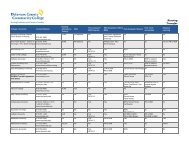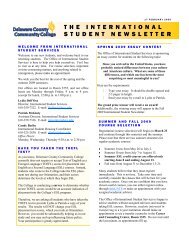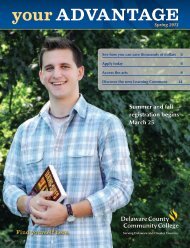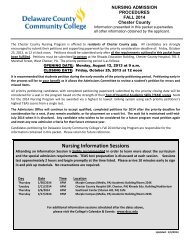2010 Catalog - Delaware County Community College
2010 Catalog - Delaware County Community College
2010 Catalog - Delaware County Community College
Create successful ePaper yourself
Turn your PDF publications into a flip-book with our unique Google optimized e-Paper software.
COURSE DESCRIPTIONS 151<br />
PLG 220<br />
Real Estate Law<br />
This course provides an introduction to real-property law.<br />
Emphasis is placed on real estate transactions and the<br />
tasks performed by lawyers and their legal representatives<br />
in representing buyers and sellers in the transfer of realproperty<br />
interest. Real-property law is analyzed including<br />
possession and ownership of property, nuisance, present<br />
and future estates, landlord and tenant, easements,<br />
conveyancing, recording, land-title assurance, vendor and<br />
purchaser, and zoning controls is analyzed.<br />
Upon successful completion of this course, students<br />
should be able to:<br />
• Analyze the basic principles of property law.<br />
• Conduct client interviews and searches in a real estate case.<br />
• Apply principles of real-property law to the preparation<br />
of forms common to real estate transactions.<br />
• Discuss relevant ethical issues.<br />
• Apply relevant modern technologies.<br />
Prereq. PLG 120 and PLG 140<br />
3 Credits 3 Weekly Lecture Hours<br />
PLG 230<br />
Estates, Trusts and Wills<br />
This is a task-oriented course that emphasizes the<br />
terminology, forms and procedures of probate and estate<br />
administration. Students also learn to draft a simple trust<br />
and a will.<br />
Upon successful completion of this course, students<br />
should be able to:<br />
• List and describe the duties of an estate paralegal.<br />
• Construct a family tree for the decedent and determine<br />
which of the decedent's surviving relatives are entitled<br />
to share (and to what degree) in the decedent's estate.<br />
• Gather necessary information to complete and file<br />
petitions for Letters.<br />
• Apply the rules concerning advertising of the grant of<br />
Letters and identify the reasons for and advantages<br />
of advertising.<br />
• Complete the renunciation form.<br />
• Identify and differentiate between various grounds for<br />
contesting a will.<br />
• Calculate the surviving spouse's elective share.<br />
• Identify and differentiate between survival actions and<br />
wrongful death options.<br />
• Gather information, complete and file various State and<br />
Federal tax returns.<br />
• Draft and file a basic accounting with the Probate Court.<br />
• Draft and file Satisfaction of Reward/Receipts<br />
and Releases.<br />
• Identify procedures for handling small estates and<br />
ancillary administration.<br />
• Draft a simple trust.<br />
• Apply relevant modern technologies.<br />
• Discuss relevant ethical issues.<br />
Prereq. PLG 120<br />
3 Credits 3 Weekly Lecture Hours<br />
PLG 240<br />
Criminal Law<br />
This course introduces students to the criminal legal<br />
system and the role of the paralegal within its framework.<br />
Emphasis is placed on the basic principles of substantive<br />
and procedural criminal law under state and federal<br />
statutes, the preparation of legal documents relevant to<br />
criminal cases and the disposition of criminal cases.<br />
Upon successful completion of this course, students<br />
should be able to:<br />
• Discuss the basic principles of criminal law.<br />
• Prepare legal documents relevant to criminal cases and<br />
procedures.<br />
• Prepare a disposition of an assigned criminal case.<br />
Prereq. PLG 110<br />
3 Credits 3 Weekly Lecture Hours<br />
PLG 241<br />
Administrative Law<br />
This course introduces paralegal students to the laws<br />
involving administration of government by various<br />
departments, agencies, boards and commissions that<br />
implement and enforce government law and policy.<br />
Students are taught the laws and procedures affecting the<br />
administrative decision-making processes on a local, state<br />
and federal government level.<br />
Upon successful completion of this course, students<br />
should be able to:<br />
• Describe the scope and application of Administrative Law.<br />
• Describe the constitutional and statutory legal bases of<br />
administrative law and administration agencies on a<br />
local, state and federal level of government.<br />
• Describe and analyze the rules, procedures and<br />
practices of government departments, agencies, boards<br />
and commissions for making rules, conducting<br />
hearings and making decisions.<br />
• Describe and analyze the scope of authority and<br />
jurisdiction for various governmental departments,<br />
agencies, boards and commissions.<br />
• Analyze the administrative, quasi-legislative and quasijudicial<br />
functions of administrative departments.<br />
• Analyze the role of legislative body, courts, statutory<br />
limits on governmental immunity and the constitution<br />
in limiting the exercise of power and authority by state,<br />
federal and local government departments, agencies,<br />
boards and commissions.<br />
• Analyze the procedures to be followed pursuant to<br />
specific statutes: Workmen's Compensation Act for<br />
Commonwealth of Pennsylvania; Public Utility<br />
Commission; Bureau of Professional and Occupational<br />
Affairs; Securities Commission; and the Human<br />
Relations Commission.<br />
• Analyze the procedures to be followed with regard to<br />
the U.S. Social Security Administration (claims and<br />
appeals); various environmental protection statutes;<br />
acts involving wages and benefits; various labor<br />
protection acts; acts that prohibit discrimination, viz.,<br />
Equal Pay Act, Age Discrimination Employment Act,<br />
Civil Rights Act, Title VIII.<br />
• Analyze the procedures to be followed with regard to<br />
local zoning, licensing and building codes.<br />
• Describe statutes that protect the public from the<br />
government including Freedom of Information Acts,<br />
Sunshine Laws (including municipal sunshine laws)<br />
and Privacy acts.<br />
• Discuss relevant ethical issues.<br />
• Apply relevant modern technologies.<br />
Prereq. PLG 110<br />
3 Credits 3 Weekly Lecture Hours<br />
PLG 242<br />
Business Organizations<br />
This course focuses on the law of business organizations.<br />
Emphasis in the course is on corporations from formation<br />
to dissolution.<br />
Upon successful completion of this course, students<br />
should be able to:<br />
• Differentiate between a sole proprietorship and different<br />
types of partnerships.<br />
• Create a corporation and identify the characteristics of a<br />
corporation that make it an important and separate<br />
legal entity.<br />
• Describe the financial structure of a corporation.<br />
• Describe the formalities of the operation of a corporation.<br />
• Differentiate between a corporation which operates in<br />
one state and multi-state corporations.<br />
• Describe the way in which corporate structure can be<br />
changed and the reasons that may precipitate such<br />
a change.<br />
• Discuss relevant ethical issues.<br />
• Apply relevant modern technologies.<br />
Prereq. PLG 110<br />
3 Credits 3 Weekly Lecture Hours<br />
PLG 243<br />
Bankruptcy Law<br />
This specialized paralegal course focuses on what the<br />
paralegal needs to know about bankruptcy. Emphasis is<br />
on the preparation of the various forms required in<br />
processing different types of bankruptcy cases. Emphasis<br />
is also on learning the terminology applicable and unique<br />
to bankruptcy law.<br />
Upon successful completion of this course, students<br />
should be able to:<br />
• Identify the terminology applied to bankruptcy law<br />
and practice.<br />
• Investigate and prepare bankruptcy petitions<br />
and schedules.<br />
• Describe and prepare forms necessary to process a<br />
bankruptcy case.<br />
• Identify and describe in detail the ordinary steps in the<br />
process of filing and administering a bankruptcy case.<br />
• Identify the different types of bankruptcy proceedings<br />
and the forms necessary for filing each type.<br />
• Distinguish between personal bankruptcy and<br />
corporate bankruptcy.<br />
• Describe the effects of a bankruptcy filing on an<br />
individual and on a corporation.<br />
• Identify the exemptions which may be claimed in a<br />
bankruptcy.<br />
• Contrast the differences between a bankruptcy and a<br />
reorganization plan and be able to process them<br />
accordingly.<br />
• Find, analyze and follow the local bankruptcy court rules.<br />
• Discuss relevant ethical issues.<br />
• Apply relevant modern technologies.<br />
Prereq. PLG 120<br />
3 Credits 3 Weekly Lecture Hours<br />
PLG 244<br />
Labor & Employment Law<br />
This course focuses on the identification and application<br />
of laws regulating the interactions among<br />
employers, employees, and labor organizations<br />
representing employees. Emphasis is on the paralegal's<br />
role in labor contract negotiations, administrative and<br />
alternative dispute resolution proceedings concerning<br />
labor disputes, and the civil litigation process that arises<br />
from such disputes in both federal and state courts.<br />
Upon successful completion of this course, students<br />
should be able to:<br />
• Identify and discuss the labor and employment laws<br />
applicable to employer/employee relationships.<br />
• Discuss the rules and procedures and evidence applicable<br />
to administrative proceedings, labor arbitration,<br />
and court proceedings involving labor disputes.<br />
• Describe the role of the paralegal in providing litigation<br />
support in administrative proceedings, arbitration, and<br />
court proceedings involving labor disputes.<br />
• Identify the role of the paralegal in providing support<br />
for collective bargaining negotiations.<br />
• Prepare and write contract negotiation proposals,<br />
grievances and demands for arbitration, unfair labor<br />
practice charges, employment discrimination claims,<br />
and post-arbitration letter briefs.<br />
• Discuss relevant ethical issues.<br />
• Apply relevant modern technologies.<br />
Prereq. ENG 050, REA 050 and MAT 040<br />
3 Credits 3 Weekly Lecture Hours<br />
PLG 246<br />
Elder Law<br />
This course will cover various aspects of law that have<br />
particular application to the elderly client. The course is<br />
designed to familiarize the student with the practical and<br />
theoretical aspects of elder law. As more and more<br />
Americans age, legislators, jurists, and other legal<br />
professionals have to address the social and legal needs<br />
of the elderly including healthcare, employment, housing,<br />
guardianship, and elder abuse problems.

















